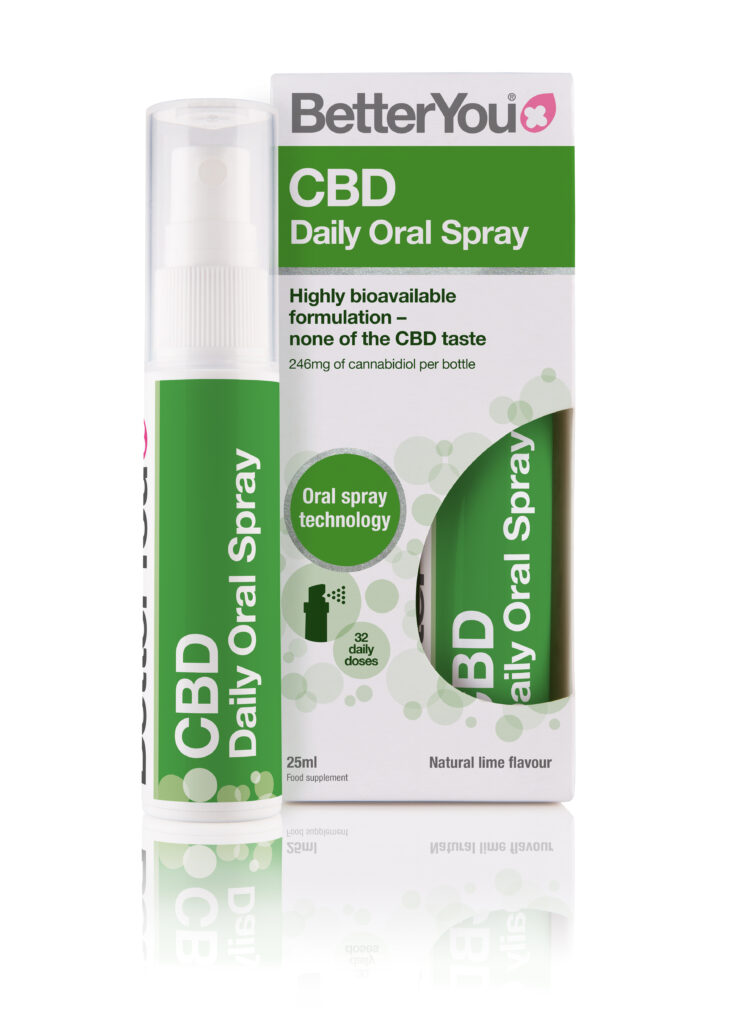The top 10 questions about CBD – answered

Consumer interest in cannabidiol (CBD) has risen dramatically in the past two years, with cited health benefits as the main driver for consumer curiosity, and surveys have indicated that between 8 to 11 per cent of U.K. adults have tried CBD in some form.
For the remaining 90 per cent of those who are yet to try CBD, there may be an abundance of questions that need to be answered before they take the plunge.
So, to help dispel some of the myths on the market, Nutritional Expert and Product Developer at award-winning natural health brand BetterYou, Keeley Berry, answers ten CBD questions most commonly asked.
1. What is CBD?
CBD is one of at least 113 known cannabinoids derived from the hemp plant. These plant-based cannabinoids are similar in structure to the body’s own cannabinoid system, called the endocannabinoid system.
The endocannabinoid system in the body is responsible for regulating sleep, appetite, anxiety and pain – CBD binds to part of the body’s endocannabinoid receptors to boost the body’s production of its own cannabinoids.
2. Is CBD oil safe?
As long as you buy from a reputed supplier who can produce certification of the products’ safety and ingredients, and you opt for the hemp-derived variety as opposed to the marijuana-based option, it should be safe.
A World Health Organisation report on CBD confirmed that “CBD is generally well tolerated with a good safety profile. Reported adverse effects may be as a result of drug interactions between CBD and patients’ existing medications.”
Controlled human studies have not found any potential for physical dependence, withdrawal or tolerance and it is not associated with abuse potential.
3. What is the evidence that it works?
CBD oil has a world of A-list celebrities vouching for its effectiveness, including Jennifer Aniston who takes it for joint pain and Victoria’s Secret model Allessandra Ambrosio who takes it to help her sleep.
Meanwhile, Kim Kardashian threw a CBD-themed baby shower last summer where guests were encouraged to blend their own CBD bath oils. But celebrity endorsement aside, what kind of research exists?
According to the US National Library of Medicine, which compiles peer-reviewed medical journals, there are over 2,1000 published studies relating to CBD with over 900 of them relating to human studies.
Still, some researchers argue that most of the studies on CBD are small-scale and more research is needed to show that it works on larger numbers of people.
4. Can you get ‘high’ from CBD?
The specific cannabinoid substance found in marijuana that makes you high is called THC, and that is the psychoactive part of the drug. The industrial hemp production that is the basis for CBD oil’s manufacture is grown to have significantly lower THC levels and higher CBD yields.
In the UK, THC is highly-regulated to ensure there is no more than 1mg of THC per bottle of product and therefore it will not induce psychoactive effects.
This underlines the importance of buying from a reputable company that can produce certification on exactly what is in the product.
5. Is CBD addictive?
Due to the extremely low levels of THC, there’s no reason why CBD oil should be addictive when used responsibly.
6. What makes taking CBD oil different from smoking cannabis?
Industrial hemp used to make CBD products is different from marijuana that is used to produce cannabis. Marijuana growth and use results in products that are illegal in the UK due to its high THC content, making it addictive. Whereas, CBD contains very low THC levels and does not induce psychoactive effects.
Whilst there are a multitude of cannabinoids that smoking marijuana provides, smoking cannabis also has its own health risks and is illegal in the UK.
7. Can you overdose on CBD?
There has been a lot of research into the efficacy and safety of CBD, and if used responsibly, it is safe for consumption and should not result in toxicity.
It’s always best to stick to the manufacturer’s instructions on the product purchased and consult a GP and discontinue use if you’re noticing any adverse effects. This can include; dry mouth, low blood pressure and drowsiness.
8. Are CBD oil and hemp seed oil the same thing?
There’s hemp seed oil at supermarkets and health food stores, and then there are CBD oil supplements that come in dropper, capsule and oral spray form. There’s a BIG difference between the two.
Hemp seed oil is made from the seeds of the hemp plant that are rich in omega 3 and 6 fatty acids – they tend to be used in cooking and cosmetics.
Hemp seeds are a food, but when you start growing the plant and extracting CBD oil from its leaves and stalks, then you’re talking about a CBD oil supplement and the manufacture of these is strictly regulated in the UK.
CBD oil can also be known as ‘hemp extract’ and is derived from the industrial hemp process that results in high CBD and lower THC containing crops – this is what you find in CBD oil supplements.
9. How and where is CBD grown and harvested?
Most CBD products that are available in the UK come from industrial hemp grown within the European Union, adhering to strict guidelines.
There are three ways CBD oil can be extracted from the hemp plant. Firstly, and most commonly, ethanol is used to extract the CBD from hemp. Alternatively, carbon dioxide is used to heat up the hemp and the resulting oil is then extracted – this is called ‘supercritical Co2 extraction’.
At BetterYou, we are currently investigating the method of extracting CBD oil using water, but it may be a while before this is commercially available.
Not all CBD products are the same quality so it’s important to look out for trusted brands who can provide analytical results for their products. Any company who makes a CBD product should be able to supply a consumer with a certificate confirming its safety, the amount of THC it contains and any residual solvents leftover from the manufacturing process – and given that CBD oil production is a new area, you are well within your rights to ask to see this.
10. What dosage do I need and how long does it take to feel the benefit?
The effects of CBD oil will vary from person to person. With an oral spray or dropper, the effects are usually noticed within 30 minutes to an hour and can last up to six hours, depending on the dose administered.
It’s important to start with a lower dose and build up to a comfortable level that is right for you.
We know that delivery via an oral spray can be much more effective as it delivers nutrients directly into the bloodstream, bypassing the digestive system where absorption can be lost, or may vary from person to person.




